Looking Beyond the ‘Racial Divide’
Sen. Barack Obama's latest, and possibly greatest, challenge is to overcome a simplistic view that the United States is hopelessly split by a racial divide that could badly damage his candidacy.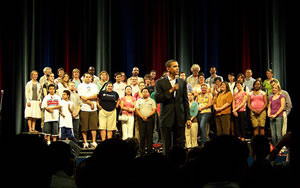
Sen. Barack Obama’s latest, and possibly greatest, challenge is to overcome a simplistic view that the United States is hopelessly split by a racial divide that could badly damage his candidacy.
I’m not arguing against the existence of such a divide. That would be dumb. But voting and polling in this year’s elections, census studies and other surveys show that attitudes are changing. The change strengthens the prospects that Obama will survive this current grim period for his campaign and go on to win the presidency.
There’s no doubt that the race issue has buffeted Obama, son of a black father from Kenya and a white mother from Kansas.
Last week, he was forced to deal with the assault of Geraldine Ferraro, a supporter of Sen. Hillary Clinton. Ferraro, the 1984 Democratic vice presidential nominee, portrayed Obama as an affirmative action beneficiary — someone who made it only because he was black.
Obama has had to condemn the sermonizing of his pastor, the Rev. Jeremiah Wright of Chicago’s Trinity United Church of Christ, who said, “We bombed Hiroshima, we bombed Nagasaki, and we nuked far more than the thousands in New York, and we never batted an eye.” In a later sermon, Wright declared, “No, no, no, not God bless America — God damn America!”
Wright has left the Obama campaign’s spiritual advisory committee. And Obama told Keith Olbermann on MSNBC: “I did not hear such incendiary language myself personally either in conversation with him or when I was in the pew. … These particular statements that have been gathered are ones that I would have strongly objected to, strongly condemned had I heard them in church. I would have expressed that concern directly to Rev. Wright.”
There was a time when association with the Rev. Wright would have been fatal to the Obama candidacy. But the nation is changing, a transformation dramatically reflected in an analysis of the census done by the Population Reference Bureau of Washington, D.C. The analysis, published in the bureau’s June 2005 Population Bulletin, focused on intermarriage.
“Interracial marriage has increased across most racial groups, and although they are still the exception to the norm, these interracial marriages are generating a growing population of multi-racial Americans,” the study said.
It found that racial intermarriage increased from less than 1 percent of all married couples in 1970 to more than 5 percent in 2000. The number of children living in interracial households rose from 900,000 in 1970 to 3.4 million in 2000.
A Gallup poll in 2003 reported that 86 percent of blacks, 79 percent of Hispanics and 66 percent of whites would accept a child or grandchild marrying someone of a different race. And a Princeton Research Associates poll the same year said that 77 percent of the respondents agreed it was all right for blacks and whites to date each other.
These polls and analyses fit in with the experiences of many Americans who have a son, a daughter, a cousin, a grandchild or another relative or a friend in an interracial marriage.
“As intermarriage continues to increase, further blurring racial and ethnic group boundaries, Americans’ notions of race and ethnicity will surely change,” the study concluded.
I saw a graphic example of this recently when I moderated a debate between the candidates for a California state Assembly seat in Los Angeles’ San Fernando Valley. The district itself is an example of racial change. Once heavily white, it is now 42 percent white, 39 percent Hispanic, 12 percent Asian and 5 percent black.
I asked the candidates what they thought of the gang warfare now afflicting Los Angeles, exacerbated by battles between African-American and Latino gangs.
One of the candidates, Bob Blumenfield, is white, Jewish and chair of the Valley Anti-Defamation League. His wife is African-American. They live across the street from his parents. She was in the audience at the synagogue where the debate was held. Twenty-five years ago, this would have been unimaginable.
Blumenfield’s reply to my question about gangs also reflected something new. A quarter of a century ago, a candidate’s reply would have been simple: more cops. Blumenfield’s was complex, reflecting his family’s life. With his wife and their daughter African-American, and knowing the racial aspect of the gang warfare, he said he worries about them both.
Primary election exit polls also offer hope to Obama that the racial divide will not cost him the election. In Deep South primaries, he won about 24 percent of the white vote, a trend that was first evident in South Carolina and continued into Mississippi. In Ohio, Clinton beat him among whites 65 percent to 33 percent. But they split the white vote in Maryland. Obama took 52 percent of the white vote in Virginia, compared to Clinton’s 47 percent. And polls show Clinton and Obama running equally well against Sen. John McCain.
It could be that race relations in America are taking a new turn, unfamiliar to those of us who see everything through the prism of mid- and late 20th century conflict. Obama talked about that Saturday in Plainfield, Ind. Speaking as “someone who was born into a diverse family, as someone who has little pieces of America within me,” he said, “what I believe is this country wants to move beyond these debates, that this country wants something different.”
In the heat of the campaign and in the blur of daily news and commentary, we forget how this contest between a woman and an African-American man shows how far the nation has come in a relatively few years. The rivalry between Hillary Clinton and Barack Obama will be remembered long after 2008 as a turning point in American history.
Your support matters…Independent journalism is under threat and overshadowed by heavily funded mainstream media.
You can help level the playing field. Become a member.
Your tax-deductible contribution keeps us digging beneath the headlines to give you thought-provoking, investigative reporting and analysis that unearths what's really happening- without compromise.
Give today to support our courageous, independent journalists.

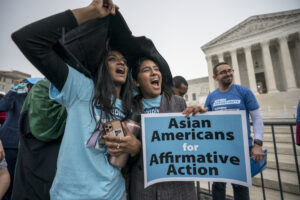
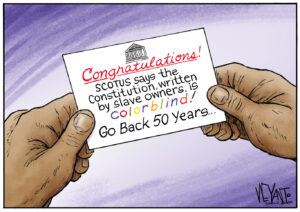
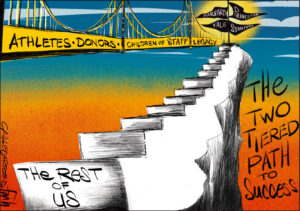

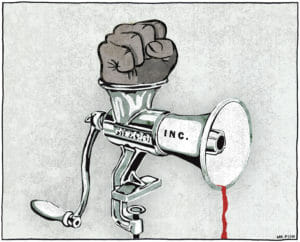
You need to be a supporter to comment.
There are currently no responses to this article.
Be the first to respond.